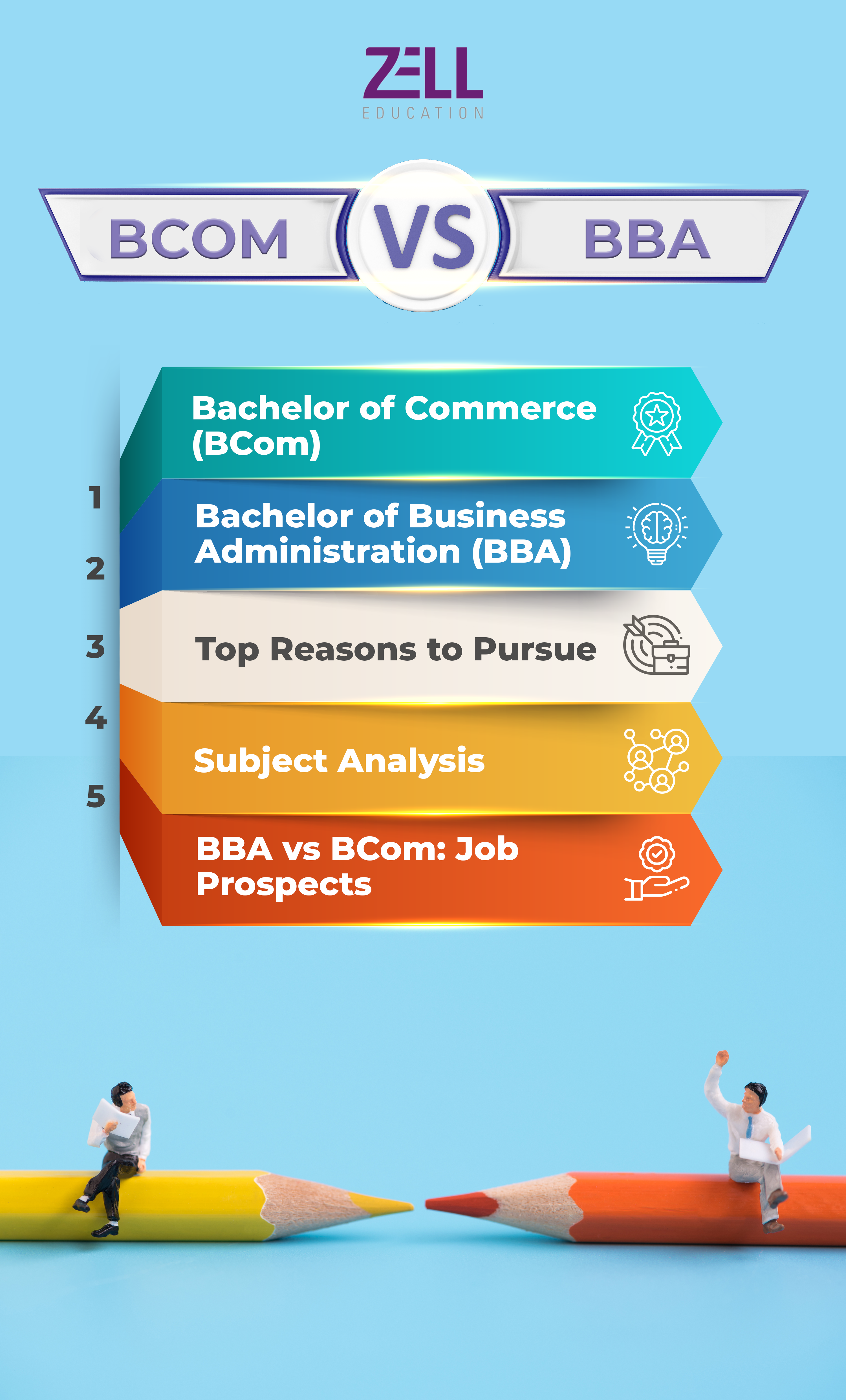Bachelor in Commerce and Bachelor in Business Administration are the two popular courses that students with commerce backgrounds can pursue. B Com focuses on the basics of commerce and related topics like accounting, marketing, and similar. On the contrary BBA is a professional course that talks mainly about business administration and related areas. This article will explain the differentiation between both BCom vs BBA.
Until 12th grade, it is still comparatively smooth sailing for all the students. However, it is only after you complete your 12th grade, you need to decide which course will take you towards your ideal career. If you are a commerce student, the options available for you are pretty vast and tempting. And yet, the two most popular streams always rise above the options are BCom and BBA. These commerce-related courses build a strong base for several professional fields in finance, banking, and management. Depending on which profession or related subject entices you the most, you can choose between either of the two courses. But if both of them BCom Vs BBA seem equally important then let’s dive in deep to understand the major differences between these courses.
Students who have just passed Class 12th can choose from any of these courses to pave their way for the future. But how are both the courses different from each other? How do students select the appropriate course?
Understanding BCom vs BBA
Overview of Bachelor of Commerce (B.Com)
B.Com is the short form for Bachelor of Commerce. It is an undergraduate program for students who wish to proceed in the path of commerce. Students have to complete a duration of 3 years to achieve a degree in B.Com in India. While some universities conduct three exams yearly, most universities conduct six semesters. The course comprises essential topics like marketing, entrepreneurship, industrial law, taxation, and accounting.
Key Subjects in BCom
In BCom, the subjects generally include:
- Financial Accounting
- Business Law
- Taxation
- Corporate Accounting
- Auditing
- Cost Accounting
- Economics (Micro and Macro)
- Business Mathematics
- Corporate Governance
Overview of Bachelor of Business Administration (BBA)
Bachelor of Business Administration or BBA is a three-year course for undergraduate students. This course is perfect for students who wish to pursue a career in Sales, HR, Marketing, Finance, and many other business-related fields.
Key Subjects in BBA
In BBA, students typically study:
- Principles of Management
- Marketing Management
- Financial Management
- Human Resource Management
- Business Economics
- Quantitative Techniques for Management
- Operations Management
- Strategic Management
- Consumer Behavior
Got Questions BCom vs BBA?
Click Here for a Free Counselling Session
Bcom vs BBA Course Structure
Core Subjects in BBA (Semester-wise Breakdown)
- Semester 1: Financial Accounting, Microeconomics, Principles of Management, India Socio-Political Economics, Quantitative techniques – I
- Semester 2: Macroeconomics, Quantitative Techniques – II, Effective Communications, Cost Accounting, Environmental Management, Principles of Marketing
- Semester 3: Banking & Insurance, Indian Economics in Global Scenario, Operations Research, Direct Tax & Indirect Tax, Human Resource Management
- Semester 4: Human Behavior & Ethics at Workplace, Management Accounting, Business Analytics, Financial Management, Customer Relationship Management
- Semester 5: Strategic Management, Research Methodology, Finance Electives, Financial Statement Analysis
- Semester 6: International Business & EXIM, Finance Electives, Operations & Supply Chain Management, Marketing Electives, Entrepreneurship & Business Plan
Elective Subjects in BBA
Elective subjects in BBA may include:
- Finance
- Marketing
- Human Resources
- Entrepreneurship
- International Business
Advanced Subjects & Specializations in BBA
In the later semesters, students can specialize in areas such as:
- Marketing Management
- Finance Management
- Supply Chain Management
- International Business
Key Differences Between BCom vs BBA
While content-wise these courses are quite different from each other, structure-wise these courses are exactly the same. BCom and BBA, both are 3-year undergraduate courses that are divided into six semesters. These popular courses are offered by several universities around India and even professional coaching centers like Zell Education, in case you choose to take up BCom with ACCA or BBA with ACCA.
Here’s a quick glance into their differences.
| Differentiators | BCom | BBA |
| Full Form | Bachelor of Commerce | Bachelor of Business Administration |
| Duration | 3 Years, 6 Semesters | 3 Years, 6 Semesters |
| Eligibility Criteria | 12th Grade passing certificate, preferably from the commerce stream | 12th Grade passing certificate, irrespective of the stream |
| Course Type | Financial course | Managerial course |
| Learning Methodology | Conventional | Modern |
| Important Learning Concepts | Financial Accounting, Business Laws, Company Law, Corporate Tax Planning, Training and Development, Auditing and Corporate Governance | Principles of Management, Business Economics, Investment Analysis and Portfolio Management, Training and Management Development, Quantitative Techniques for Management |
| Course Objective | To prepare you for challenging professions in finance like Accountancy, Tax Management, Capital Budgeting | To help you build leadership skills in the field of management. |
| Global Professional Certifications After The Course | Association of Chartered Certified Accountants (ACCA), Certified Public Accountant (CPA) | Association of Chartered Certified Accountants (ACCA), Certified Management Accountant (CMA) |
| Job Opportunities & Scope | Account Executive
Financial Analyst Tax Consultant Accounts Manager Business Consultant |
HR Executive
Marketing Executive Sales Executive Financial Advisor Public Relations Manager |
| Course Fees | Ranges from INR 10,000 to 50,000 | Ranges from INR 50,000 – INR 2,00,000\ |
Career Opportunities After BCom vs BBA
Job Roles & Industry Scope
Both degrees offer a wide range of career opportunities, but in different areas:
- BCom Graduates: Typically work in finance, accounting, or taxation sectors. Common career options after B. Com includes Financial Analyst, Accountant, Tax Consultant, and Business Consultant.
- BBA Graduates: Career after BBA includes roles in business management, marketing, HR, and operations. Common roles include HR Executive, Marketing Executive, Business Analyst, and Operations Manager.
Common Career Paths for BBA Graduates
- Business Consultant
- HR Executive
- Marketing Executive
- Sales Executive
- Operations Manager
Common Career Paths for BCom Graduates
- Accountant
- Financial Analyst
- Tax Consultant
- Accounts Manager
- Financial Advisor
Salary Expectations
The salary varies based on industry, role, and experience. However, BCom graduates with certifications like ACCA or CA tend to earn higher salaries than BBA graduates initially.
BCom vs BBA Salary Comparison
Salary Trends for BBA Graduates
- Entry-level salary: Rs. 6 LPA to Rs. 10 LPA (with professional certifications like ACCA or MBA)
Salary Trends for BCom Graduates
- Entry-level salary: Rs. 6 LPA to Rs. 20 LPA (with professional certifications like ACCA, CA, or CPA)
Factors Affecting Salary Growth
Factors that influence salary include:
- Professional certifications
- Experience
- Industry demand
- Company size
Higher Education & Professional Certifications
Further Studies After BCom
- CA (Chartered Accountancy)
- ACCA (Association of Chartered Certified Accountants)
- CPA (Certified Public Accountant)
- MBA (Master of Business Administration)
Further Studies After BBA
- MBA (Master of Business Administration)
- MMS (Master of Management Studies)
- MFM (Masters in Financial Management)
- PGDM (Post Graduate Diploma in Management)
Specializations in BCom vs BBA
Popular BBA Specializations
- Marketing
- Finance
- Human Resource Management
- International Business
Popular BCom Specializations
- Accounting
- Finance
- Taxation
- Corporate Law
BCom vs BBA: Scope in India
Industry Demand for BBA Graduates
There is a growing demand for skilled managers in various industries like HR, Marketing, Operations, and Finance.
Industry Demand for BCom Graduates
BCom graduates are in high demand in finance, accounting, banking, and taxation sectors.
BCom vs BBA for Finance Careers
Strengths of BBA in Finance
BBA provides a strong understanding of business operations and management, which is beneficial for roles in business consulting, HR, and sales management.
Strengths of BCom in Finance
BCom provides in-depth knowledge of accounting, taxation, and corporate finance, making it a better choice for those seeking careers in finance and accounting.
Pros & Cons of BCom and BBA
Both degrees offer unique advantages depending on your career interests and goals. BCom is ideal for those interested in accounting, finance, and taxation, while BBA is better suited for those looking to pursue management roles.
BCom vs BBA: Which is More Versatile?
BBA as a Business Generalist
BBA offers a broad range of business-related knowledge and can lead to careers in a variety of fields including marketing, HR, finance, and management.
BCom as a Finance and Accounting Specialist
BCom is more specialized in accounting and finance, making it ideal for those pursuing careers in finance, accounting, or taxation.
Which Course Should You Choose?
Factors to Consider
Consider your interests in management vs. finance, as well as the type of role you envision in the future. Both BCom and BBA open doors to successful careers but in different sectors.
Personal Interest & Career Goals
- BBA: Ideal for those who want to become business leaders or managers.
- BCom: Ideal for those who are interested in accounting, finance, and business law.
Planning to Pursue Finance and Accounting Career?
To Book Your Free Counselling Session
Conclusion
Ultimately, your decision between BCom and BBA will depend on your career goals and personal interests. If you’re interested in finance and accounting, BCom is a better fit. If you aspire to manage businesses and work in leadership roles, BBA will be more suitable for you. Both degrees offer excellent career opportunities, and professional programs like CA, MBA and ACCA certification can enhance your prospects in both fields.
FAQs on BCom vs BBA
Which is better, BCom or BBA?
The BBA course mainly lets the students pursue a career in the managerial and business fields. Bur B.Com opens diverse sectors in front of the students. B.Com students can pursue several higher degrees like CA, ACCA, and MBA. However, BBA students mostly pursue an MBA or ACCA.
What is the Scope of BBA?
Yes, BBA students can join as executives in departments or organizations like HR, finance, etc. Further, the BBA candidates can pursue an MBA to get promoted from their existing job positions.
Who earns more BBA or BCom?
B.Com students who have also achieved a ACCA certificate have a prosperous career with a salary package of Rs. 6 to 20 lacs per annum. BBA candidates usually earn Rs. 6 lacs to Rs. 10 lacs per annum along with the ACCA course. So, even with the professional certification of ACCA, B.Com candidates earn more than BBA professionals.
BCom vs BBA, which is better for a career in Banking?
For finance and banking related professions, BCom serves as a better foundation rather than BBA.
Which course between BBA and BCom is better for business?
If you’re more interested in the management side of the business then BBA is the right course for you, but if you’re more interested in the finance side of the business then BCom is the right course for you. Both of them contribute to the business equally.
Which course between BCom vs BBA is better to learn accounting?
For finance and accounting related professions, BCom serves as a better foundation rather than BBA.


